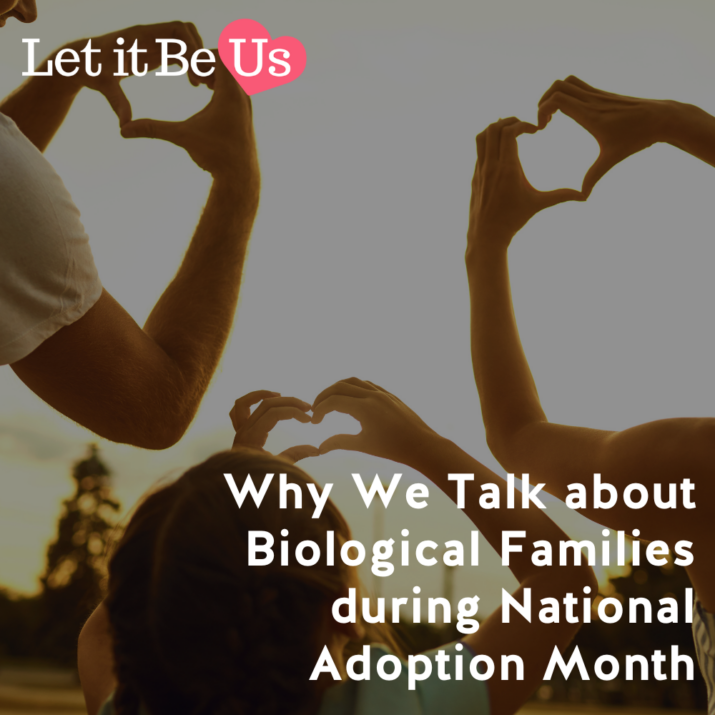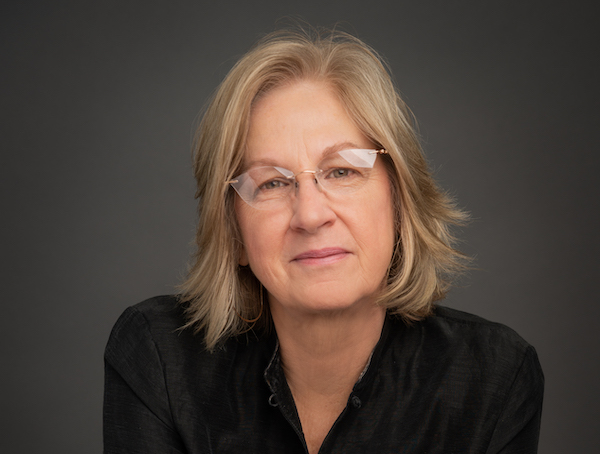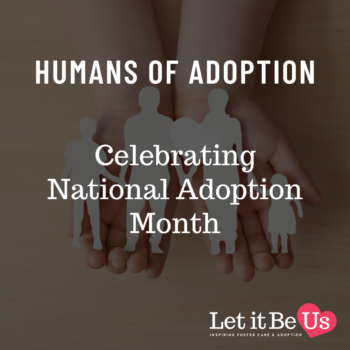Why We Talk about Biological Families during National Adoption Month
- Foster Care , Foster Parent Education
- November 17, 2022

In honor of National Adoption Month, Let It Be Us’ Deputy Director Alex Montgomery explores the importance of the biological family.
“The question to ask is not ‘Who does this child belong to?’ but ’Who belongs to this child?’” Sharon Roszia, The Open Adoption Experience
At Let It Be Us, we talk a lot about permanency. Permanency is a child welfare term that refers to a bunch of things related to the stability of a child’s life. Adoption is a form of permanency, but so is the keeping of relationships with friends, teachers, community, and yes, biological family. Consistent, stable relationships of all sorts help children thrive, and that’s what we want for all the children in Illinois’ foster care system.
My daughter came to me through private adoption, meaning her birth mother chose me and voluntarily placed her child with me. These circumstances make our family dynamics different than those involved with the foster care system. Of course health and safety come first, but recognizing and honoring the importance of biological connections is an important step in the road to self acceptance for children who are raised outside of their biological families.
Children who live, for any significant part of their childhoods, outside of their biological families have a trickier road to developing their identities than most children who don’t. While children are young, they don’t seem to be considering who they are, why they look the way they do or why they like the things they like. But as they grow, especially during adolescence, all of these things become increasingly important. They are making decisions about who they want to be and looking around for role models (or the reverse – people they don’t want to be like).
But, you might ask, how do you create space for a relationship with the biological family – a family you may not know at all? We’ve got some ideas.
Here is a list of 5 ways you can open the door to the biological family, whether a child ends up being adopted into your family or is temporarily placed with you.
- Make sure you have a photo of the biological parents, ideally with the child (or children). You can ask the caseworker for a photo – or in my case, I was able to take a photo of my daughter’s birth mom holding her just after her birth.
- Send a journal with a letter to biological parents at the child’s first visit. This letter is an open door to communication, you can include information about the child’s schedule (like when does the child have naptime?) and maybe throw in a compliment to develop trust with the biological parent (like the child was dancing, she must have gotten her moves from you!”) The journal gives the parent the opportunity to write back and allows the parent to feel involved in the child’s life.
- If at all possible, be the person to bring the child to and from visits. Making the effort to bring the child to visits, shows the biological parents that you care about their relationship and that you are willing to put in the effort to make it work.
- Ask the biological parents: What does your child call you? Especially with a young child, she may call you Mom or Dad – so understanding the terms the child uses with her biological parents is important not only to distinguish who the child is speaking to, but also to show respect for the role of the biological parents in the child’s life.
- Gifts, gifts, gifts! I don’t mean expensive gifts, but thoughtful gifts. The art that a child makes at school, or a gift featuring a photo of their child. Sentimental items or gifts that connect the biological parents to their child.
Creating a trusting relationship with the biological families of children in care is about truly loving the children in your home. It isn’t easy, but it is worth it.
To hear more about what it’s like to have an open and positive relationship with the biological families of children in foster care and in open private adoptions, check out our podcast and webinars on the topic.

Dr. Susan A. McConnell is the Founder and Executive Director of Let It Be Us, an Illinois licensed child welfare agency with the mission of providing collaborative, innovative solutions of effective recruitment and placement within Illinois foster care and adoption. Susan has an MBA from DePaul University and a Doctorate Degree in Social Work from the University of Southern California, where her work focused on permanency within child welfare. She is the Chair of the Permanency Committee of the Illinois Statewide Foster Care Advisory Council, appointed by the Director of the Illinois Department of Children and Family Services (DCFS) in 2017. She is also an adoptive parent with over 30 years of open adoption experience. She can be reached at susanmcconnell@letitbeus.org.
About Let It Be Us
Let It Be Us is a nonprofit organization dedicated to changing the landscape of foster care and adoption in Illinois. Our mission is to inspire foster care and adoption so more children in care grow up in stable, healthy homes. Funds raised will go to programs that build a strong and innovative bridge between our waiting children and foster and adoptive parents. Learn more at letitbeus.org



